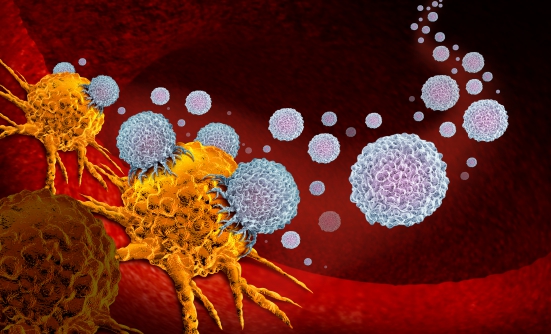When you’re diagnosed with cancer, it’s very common to feel that your body has failed you. But what if your own immune system could be harnessed—using state-of-the-art therapies—to find and destroy the cancer cells (or the tumor)? That’s essentially how immunotherapy works.
Cancer cells multiply and spread, because they can hide from our immune system. Immunotherapy drugs work by robbing cancer cells of their ability to hide, or by revving our immune system so that it can identify and attack those cells.
If your medical oncologist recommends immunotherapy as part of your cancer treatment plan, you may be wondering what to expect. The type of immunotherapy you will receive, including the frequency and length of treatment, will depend on the type and the stage of the cancer, among other factors.
Before beginning any treatment, you should speak with your oncologist to make sure you fully understand the immunotherapy protocol that is being recommended to you.
The Side Effects of Immunotherapy
Like other cancer treatments, immunotherapy can cause side effects. Immunotherapy works by taking the brakes off your immune system. In doing so, it can cause immune-mediated adverse reactions. This means that your immune system can go into overdrive and attack healthy organs and tissues, including your skin, liver, digestive system, endocrine glands, and other body systems.
The good news is that in general, side effects associated with immunotherapy are often less common and less severe than those caused by other treatments. However, it is important to be aware of possible side effects with immunotherapy, understand why they are happening, and what can be done if they appear.
Any side effects that occur while receiving immunotherapy are likely to occur within the first few weeks of treatment; however, some could start even months after starting treatment, or even as late as a year after completing the immunotherapy.
If you’re receiving immunotherapy and notice any new, or worsening, symptoms, let your medical oncologist know immediately. Many side effects can be treated and resolved—often with over-the-counter medications or by tweaking the treatment protocol—particularly if they’re addressed early on.
You should always consult with your oncologist before starting or stopping treatment with immunotherapy, and when using any drug, whether it is prescribed by your doctor or an over-the-counter drug used to manage side effects.
Symptoms to Watch for
Below are some symptoms to watch for during treatment with immunotherapy. If and when, symptoms occur, inform your doctor right away.
Skin problems. Among the most common side effects caused by immunotherapy drugs are skin irritation and/or rash. Other skin issues may include changes in skin color, blisters, and redness. You may be able to treat mild symptoms with a topical moisturizing cream or ointment. More severe reactions, such as a rash that covers large areas of the skin, or complications, such as infection, may require further evaluation by a dermatologist and a reevaluation of the immunotherapy treatment protocol.
Flu-like symptoms. Flu-like symptoms are sometimes seen in patients who are receiving immunotherapy, because the prescribed drug can trigger a response from the immune system that is similar to the immune response triggered against the influenza virus (or flu). These side effects include fever, chills, nausea, vomiting, fatigue, headache, and body aches. Consult with your oncologist for ways to help manage these symptoms.
Diarrhea. Frequent diarrhea can be a sign that the immunotherapy is causing inflammation in the gastrointestinal tract. It can also cause blood or mucus in the stool. Diarrhea is concerning, especially if it is severe, because it can cause dehydration and electrolyte imbalance. You may be able to treat your symptoms with an over-the-counter anti-diarrheal medication but do so only after consulting with your oncologist. In addition, try to stay well-hydrated by drinking clear fluids, and avoid dairy products and foods that irritate the digestive system.
If you’re experiencing bouts of diarrhea every day, along with painful abdominal cramping, you may need to get a prescription for a corticosteroid or another immunosuppressive medication to help control the inflammation.
Vague symptoms. Immunotherapy can also cause vague and nonspecific symptoms, such as joint or muscle pain, loss of appetite, weight loss, bloating, fatigue, nervousness, shortness of breath, or irritability. Don’t assume that any such symptoms are a normal part of your treatment, and something you just need to “power through.”
It’s important to mention anything out of the ordinary to your doctor, because it could indicate an issue that needs to be identified and treated right away. Left unchecked, immune-mediated adverse reactions can cause serious problems and may affect the course of your cancer treatment.
Staying Ahead of Symptoms: Monitoring Markers
Sometimes, immunotherapy can trigger immune-mediated adverse reactions that don’t cause any noticeable side effects. Throughout treatment, your cancer care team will regularly monitor several markers in your blood that could signal an adverse reaction. For example, they’ll check your liver enzyme levels to make sure that your liver is functioning well, and your hormone levels to make sure that the treatment is not affecting your thyroid gland.
If the blood tests reveal a possible reaction, your doctor can address it before it has an opportunity to become more serious.
In addition to traditional treatments for managing side effects, receiving treatment at a comprehensive cancer care center that offers supportive care services can make a significant difference in your quality of life. Services such as nutrition therapy, naturopathic support, physical therapy, and mind-body support can help manage side effects while undergoing immunotherapy and after it is over.
Promising Developments in Cancer Care
Today, many immunotherapy medications are available for the treatment of different types of cancer, including bladder cancer, melanoma, Hodgkin lymphoma, kidney cancer, head and neck cancer (or oral cancer), lung cancer, and others. These drugs are being rigorously studied in clinical trials for use in conjunction with other treatments, such as chemotherapy, radiation therapy, as well as other types of immunotherapies.
The developments that are happening in cancer immunotherapy research are exciting, and we hope they will enable us to offer a wider range of treatment options to help patients fight cancer and live longer, healthier lives.
Sources
- National Cancer Institute. Immunotherapy to Treat Cancer. November 28, 2018. www.cancer.gov/about-cancer/treatment/types/immunotherapy#4.
- Society for Immunotherapy of Cancer. Side Effects. www.sitcancer.org/clinician/resources/melanoma/side-effects.
- European Society for Medical Oncology. What Are Immunotherapy Side Effects? 2017. www.esmo.org/content/download/124130/2352601/file/ESMO-Patient-Guide-on-Immunotherapy-Side-Effects.pdf.
- American Cancer Society. What Is Cancer Immunotherapy? August 8, 2016. www.cancer.org/treat ment/treatments-and-side-effects/treatment-types/immunotherapy/what-is-immunotherapy.html.
Key Points
- Immunotherapy drugs work by robbing cancer cells of their ability to hide, helping our immune system to identify and destroy those cells
- Like all drugs, immunotherapies can cause adverse reactions by attacking not only cancer cells but also healthy cells and organs, such as our skin, liver the digestive system
- Most of the side effects of immunotherapy are less common and less severe than those caused by other cancer treatments, although some can be life-threatening
- Side effects can appear during immunotherapy within the first few weeks of treatment, but some can happen months, or even a year, after starting treatment
- If unmanaged, immune-mediated adverse reactions can cause serious issues and may affect your cancer treatment
Patient Resources
American Cancer Society
https://www.cancer.org/treatment/treatments-and-side-effects/treatment-types.html
Cancer.Net
https://www.cancer.net/navigating-cancer-care/how-cancer-treated/immunotherapy-and-vaccines/understanding-immunotherapy
Cancer Research Institute
https://www.cancerresearch.org/immunotherapy/cancer-types
National Cancer Institute
https://www.cancer.gov/about-cancer/treatment/types/immunotherapy
Society for Immunotherapy of Cancer
https://www.sitcancer.org















